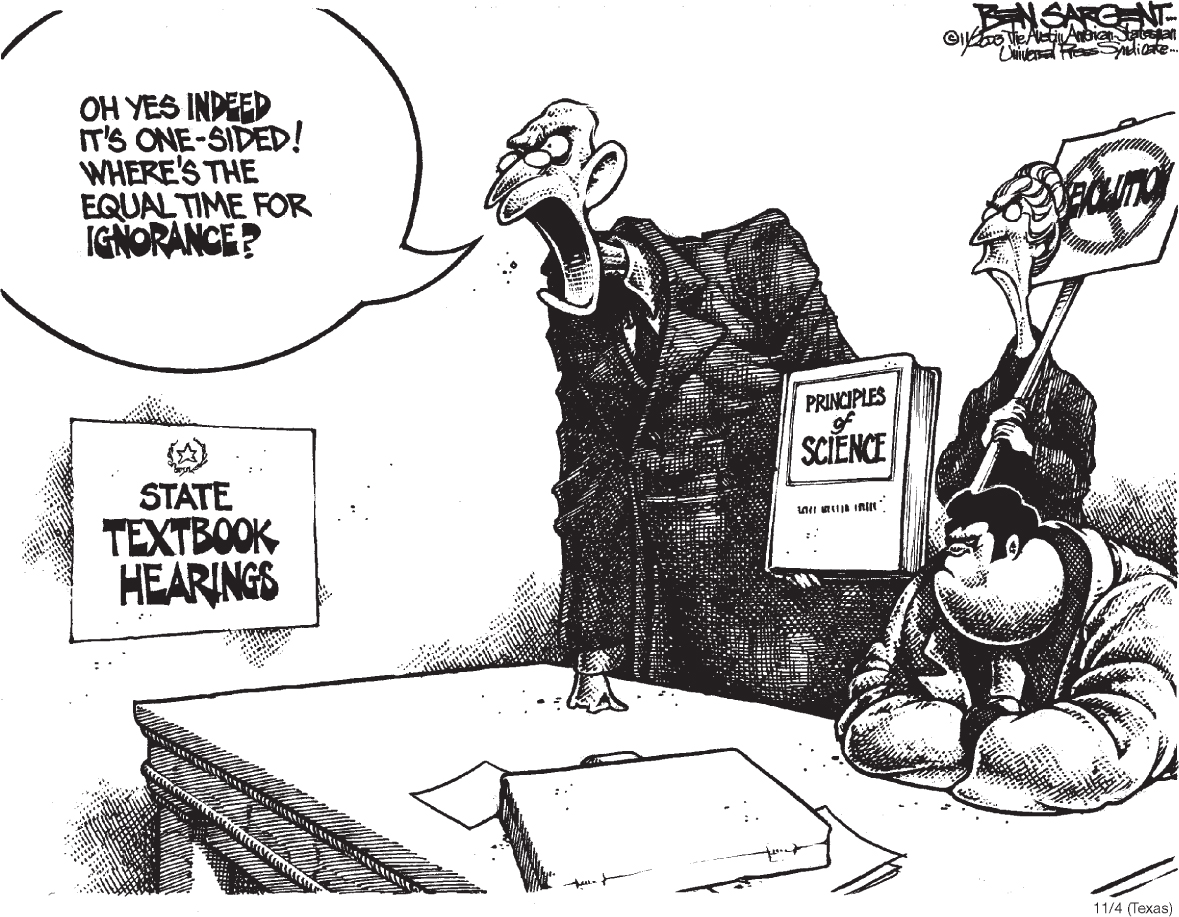Antievolutionists Lose Critical Fight in Texas Textbook Decision
DOI: 10.1063/1.1650220
A months-long effort in Texas to weaken the scientific explanation of evolution in high-school biology textbooks failed in early November when the State Board of Education approved 11 books and other material that had been vetted by a panel of biologists. With an 11-to-4 vote, the board rejected attempts by social conservatives, as well as members of the Discovery Institute, a Seattle-based creationist organization, to include what they claimed were significant weaknesses in Darwin’s theory of evolution through natural selection.
“I think this is very good, not just for Texas children but for schoolchildren in general, because textbook publishers don’t like to put out books that can’t be adopted in Texas and California,” said physicist Steven Weinberg of the University of Texas at Austin. Weinberg, who testified before the board against attempts to water down evolution in the textbooks, said the debate was really “an effort to avoid what they [antievolutionists] see as a negative impact of science teaching on religious belief.”
The Discovery Institute failed in recent attempts to weaken the teaching of evolution in New Mexico and Louisiana, but the Texas dispute was especially critical because that state is the second largest purchaser of textbooks nationally—behind California—and has strong influence over textbook publishers. The Texas board will spend $193 million purchasing the biology books, and officials in each of the state’s 1000 school districts will then decide specifically which of the 11 approved texts to use.
Physicist C. A. Quarles of Texas Christian University in Fort Worth said that the 11-to-4 board vote left him wondering “what were these four people doing? What it means is that we’re not out of the woods by any means in teaching science. You have to ask why it wasn’t 15-to-0.”
The challenge to evolution was based on a Texas requirement that textbooks cannot be approved if they contain factual errors. Antievolutionists, using a template developed by the Discovery Institute, challenged what the institute describes as “the icons of evolution”—such things as Haeckel’s embryos, drawings from the 1800s that were intended to show adaptation, and the Miller–Urey experiment in the 1950s that dealt with the development of biological molecules.
The antievolutionists then used the alleged errors to claim that evolution is a “theory in crisis” and that the students of Texas would be best served by listing all of the “weaknesses” in the textbooks. In written testimony to the board, Robert Dennison, president of the Texas Association of Biology Teachers, said the “critics claim they only want to increase and improve the coverage of evolution by removing these ‘errors’ and thereby exposing the so-called weaknesses of evolutionary theory. I grant that biologists do debate some of the mechanisms of evolution. However, none of the current debates … involve any of the alleged errors presented by the Discovery Institute.”
“By focusing on a few alleged errors and then correctly pointing out that biologists debate about evolution,” Dennison continued, “the [critics] are using a ‘bait and switch’ tactic in an attempt to discredit all of evolutionary theory.”
Quarles, head of the Texas section of the American Physical Society, led an effort supported by APS, the American Institute of Physics, and the American Geophysical Union to alert other Texas scientists about the controversy. On 1 November, that effort resulted in a letter signed by about 550 Texas scientists and sent to the board of education. In addition to Quarles and Nobel laureate Weinberg, signatories included former presidential science adviser Neal Lane of Rice University and Nobel laureates Michael Brown and Johann Deisenhofer, both of the University of Texas Southwestern Medical Center in Dallas.
Following the board’s decision, Discovery Institute President Bruce Chapman said that the Texas Education Agency commissioner’s statement that all factual errors in the textbooks will be corrected was “real progress in the cause for science education reform. We were already happy that a number of embarrassing errors that overstate the evidence for evolutionary theory were being fixed.”
“A few of the publishers put in qualifiers that are perfectly fine and don’t weaken evolution,” said Steven Schafersman, president of Texas Citizens for Science, an organization that has for years fought attempts to dilute the teaching of evolution. “The Discovery Institute people didn’t accomplish what they wanted, which was to have the books include their bogus weaknesses. The biology books are as good now as they have ever been, and we’re keeping them that way. This was a victory for us.”

SARGENT ©2003 AUSTIN AMERICAN STATESMAN
REPRINTED WITH PERMISSION OF UNIVERSAL PRESS SYNDICATE. ALL RIGHTS RESERVED.

More about the authors
Jim Dawson, American Center for Physics, One Physics Ellipse, College Park, Maryland 20740-3842, US .




